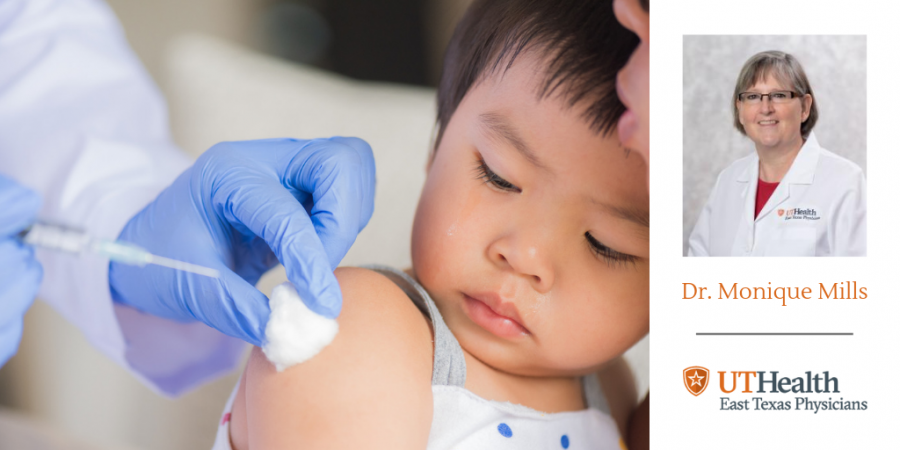
If you are reading this, chances are you are fully immunized. That means when you were a child, your parents took you to the doctor for your checkups and you got all of your shots. Since then, your immune system has protected you from a host of infectious diseases that used to kill a lot people. But you’ve probably never thought of it like that, so let’s take a look at how immunizations save lives every day.
If you are like me, you pushed a shopping cart around your favorite grocery store one day this week. The 11-month-old baby who was sitting in the that cart earlier was fussy and had a lot of nasal drainage. She is in the beginning stages of coming down with chickenpox. This is the time before the rash breaks out. The handle of your shopping chart is loaded with varicella virus, which causes chicken pox. The virus can live on surfaces outside the body for up to 24 hours. Did you know that adults who get chickenpox have a high risk of developing complications of the infection such as involvement of the lungs or brain? Your fully immunized status saved you from getting this infection. Chickenpox is a vaccine-preventable infection.
You and your 6-year-old daughter went to Dallas last weekend for your nephew’s seventh birthday party. At the party there was a little boy with a cough and red face. Clearly, he did not feel well and left the party early. Turns out he has measles. Everyone at the party has been exposed because the measles virus floats in the air. Cases of measles are on the rise. For those not immunized, there is a 90% chance that they will get measles if they are exposed to the virus. For those who are infected, there is a 10% chance that they will die from the illness. But you and your child are fully immunized. You are safe. Measles is a vaccine-preventable infection.
Now you find yourself in the middle seat on a three-hour flight to Baltimore to visit your sister’s new baby. The woman sitting next to you is chatting you up about your travel plans. Which is fine except for the throat-tickle, hacky cough that she has. Well, that’s pertussis. Pertussis causes low-grade symptoms in healthy adults, but it causes life-threatening whooping cough in infants. Vaccine-imparted immunity against pertussis decreases between childhood and adulthood. That is why you got the vaccination against pertussis (TDaP) the last time you were pregnant and why you asked your parents to get the vaccination before your baby was born. And now, by being immune to pertussis, you are not going to take the infection with you to Baltimore where your sister’s new baby is waiting for your hugs and kisses! Pertussis is a vaccine-preventable infection.
Immunizations save lives every day by allowing the immune system to fight off infections to which we don’t even know we have been exposed. Here is a list of the diseases that your children are protected from by the age of 4 years if they receive immunizations according to the current recommendations: hepatitis A, hepatitis B, tetanus, diphtheria, pertussis, rotavirus, hemophilus influenza, streptococcus pneumoniae, polio, measles, mumps, rubella and varicella. Older children and teenagers are now immunized against meningococcal meningitis and against human papilloma virus, which causes several types of genital cancers in both men and women.
Nowadays, there is a lot of skepticism about the practice of immunizing children. Several generations have passed since we have seen the devastating effect that an outbreak of measles or whooping cough can have on a community. The internet is full of information about why we should or should not immunize our children. It can be very difficult to know if the information that we see on the internet comes from strong, evidence-based science, or not.
For me, the most compelling thing that the internet has to offer is the ability to look back in time. I have recently been able to trace my ancestors back to the 1600s. It is amazing to see the handwritten vital records of births, baptisms, marriages and deaths from dozens of generations ago now scanned in to an electronic database that is available at my fingertips. And sobering for me to know that in 1859 New Bedford, Massachusetts, a distant cousin of mine buried three of her children within 10 days of each other. They all died of diphtheria. Since the early 1920s, diphtheria has been a vaccine-preventable infection.
In my practice of general pediatrics, I have never seen diphtheria, or tetanus, or polio, or measles for that matter. Unfortunately, measles cases are on the rise – right now – for real. I have no doubt that some, if not all, of the other vaccine-preventable infections will find their way back to us if more parents choose to not immunize their children. We need to be better students of history so that we can understand the truly remarkable role that immunizations have played in keeping us healthy. We need to be more discriminating consumers of the enormous amount of information that we are exposed to every day on the internet, social media, and while we stand in line at the grocery store. As we work together to protect the health and well-being of our children and our community, I hope that you will consider my strongest recommendation to make sure that all your family members, children and adults alike, are fully immunized.
For reliable information about immunizations, go to cdc.gov from the Centers for Disease Control and Prevention, or healthychildren.org from the American Academy of Pediatrics.
Information provided by Monique R. Mills, MD, UT Health East Texas Physicians pediatrician. To schedule an appointment with Dr. Mills, call 903-877-7343.

